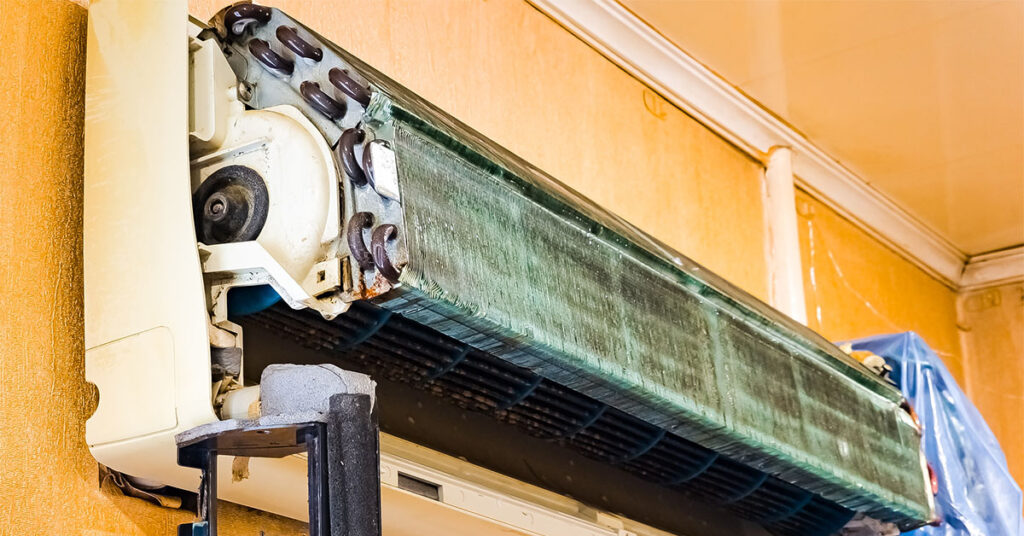Unexpected problems with the HVAC (Heating, Ventilation, and Air Conditioning) system can be frustrating and concerning for Dallas, Texas homeowners. Many homeowners experience the issue of their HVAC unit leaking water. Despite appearing to be a minor inconvenience, an unrepaired leak in an HVAC system can be devastating.
Understanding why your HVAC is leaking is crucial to preserving the comfort and safety of your home and avoiding expensive repairs. This blog post will describe the causes of water leaks in HVAC systems, what to look for, potential damage, and tips for preventing them. Take a look at how you can deal with HVAC water leaks.
Why is My HVAC Leaking Water
Keeping your home comfortable in Dallas requires understanding why your HVAC system leaks water. Let’s explore the common causes behind these leaks in more detail:
Clogged Condensate Drain Line
The condensate drain line in your HVAC system is responsible for removing excess moisture produced during the cooling process. However, in Dallas’s humid climate, this drain line is prone to clogging. Over time, dust, dirt, algae, and other debris can accumulate in the drain line, restricting the flow of water. As a result, water backs up and may overflow into your home, causing damage to ceilings, walls, and floors.
Dirty or Frozen Evaporator Coil
The evaporator coil in your HVAC unit plays a crucial role in cooling your home by absorbing heat from the air. In Dallas’s hot summers, the evaporator coil works overtime to keep your home comfortable. However, if the coil becomes dirty or accumulates debris, its ability to absorb heat is compromised. Additionally, inadequate airflow or refrigerant issues can cause the evaporator coil to freeze, leading to excessive condensation and water leakage.
Improper Installation or Sealing
In the hustle and bustle of Dallas life, HVAC installations may sometimes be rushed or performed by inexperienced technicians. Improper installation or inadequate sealing can result in air leaks and moisture seepage over time. It can lead to water leaks around the unit or within your home, especially in older HVAC systems that need to be appropriately maintained.
Refrigerant Leak
Refrigerant is essential for the cooling process in your HVAC system. However, refrigerant leaks can occur due to age, wear and tear, or physical damage to the unit. When refrigerant levels are low, the evaporator coil may not function properly, leading to ice formation and subsequent water leakage.
Dallas homeowners can prevent further damage to their homes by understanding these potential causes of HVAC water leaks. Next, let’s look at signs that your HVAC system may be leaking water.
Signs of HVAC Water Leaks
Identifying HVAC water leaks early and preventing costly damage to your home is crucial for Dallas homeowners. Here are some common indicators to watch for:
Water Puddles
Keep an eye out for water puddles around your HVAC unit or nearby areas. Puddles may indicate that water is leaking from the unit or its components, such as the condensate drain line or evaporator coil.
Dampness or Water Stains
Check for dampness or water stains on walls, ceilings, or floors near your HVAC unit. These signs suggest that water may be leaking and seeping into your home’s structure, potentially causing water damage and mold growth.
Unusual Sounds
Pay attention to any unusual sounds coming from your HVAC system, such as dripping or gurgling noises. These sounds may indicate that water is not draining correctly and is accumulating within the unit, leading to leaks.
Reduced Cooling Efficiency
If you notice that your HVAC system is struggling to cool your home efficiently or if there are fluctuations in indoor temperature, it could be a sign of water leakage affecting the system’s performance.
Increased Humidity Levels
Dallas residents are no strangers to humidity, but if you notice a sudden increase in indoor humidity levels despite your HVAC system running, it could indicate a water leak affecting the system’s ability to dehumidify the air effectively.
Musty Odors
Mold and mildew thrive in damp environments, so if you detect musty odors coming from your HVAC system or the surrounding areas, it may indicate water leakage and potential mold growth.
If you see any of these signs in your Dallas home, make sure you solve them right away so you don’t cause further damage to your system.
Preventive Maintenance Tips
A proactive approach to preventing HVAC water leaks is essential for Dallas homeowners. Keep your system running smoothly with these preventive maintenance tips:
Schedule Regular Maintenance
Arrange for annual HVAC maintenance by a professional technician. Regular inspections and tune-ups can help identify potential issues before they escalate into water leaks.
Change Air Filters
Replace your HVAC system’s air filters regularly, typically every 1-3 months. Clean filters ensure proper airflow, reducing the risk of evaporator coil freezing and water leakage.
Keep the Area Around the Unit Clean
Clear any debris, vegetation, or clutter from around your outdoor HVAC unit. Proper airflow is essential for efficient operation and preventing overheating, which can lead to water leaks.
Monitor Humidity Levels
Invest in a humidity monitor for your home and keep humidity levels within the recommended range (ideally between 30-50%). High humidity levels can exacerbate condensation issues in your HVAC system, leading to water leaks.
Inspect and Clear Drain Lines
Regularly inspect the condensate drain line for clogs or blockages. If you notice any signs of a clog, such as standing water or algae growth, clear the drain line using a vacuum or specialized cleaning solution.
Address Refrigerant Leaks Promptly
If you suspect a refrigerant leak in your HVAC system, contact a professional technician immediately for inspection and repair. Low refrigerant levels can lead to ice formation on the evaporator coil and subsequent water leakage.
Follow these preventive maintenance tips to minimize the risk of HVAC water leaks and keep your system running efficiently and reliably.
Read More: Why Are Plumbers So Expensive
Conclusion
Maintaining a comfortable and safe home environment in Dallas requires addressing HVAC water leaks. Understanding the causes, signs, and potential damage associated with these leaks can help homeowners prevent them. Maintaining HVAC systems requires regular maintenance, such as scheduling professional inspections, changing air filters, and monitoring humidity levels.
A timely intervention is crucial for preventing costly repairs and preserving the efficiency of your HVAC system. Keeping these tips in mind can ensure Dallas homeowners are protected against HVAC water leaks.

